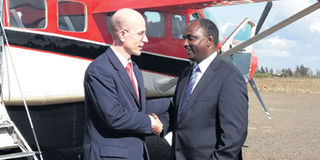Good prospects for farmers in dry North

German Ambassador to Kenya Andreas Peschke (left) and Marsabit Governor Ukur Yattani at the Marsabit Airstrip when the envoy launched the Agriculture, Livestock and Fisheries Strategic Plan on Wednesday. PHOTO | JULIUS SIGEI |
What you need to know:
- Apart from support to drought resilience in the arid lands of Northern Kenya, German Development Cooperation promotes food security by supporting agricultural productivity in Western Kenya.
- The key is putting farmers’ needs at the core, while at the same time pushing for market-orientated solutions. I think here in Kenya, all the knowledge and expertise is already available on the ground, our role as friends is to facilitate innovations and progress.
Marsabit County this week launched its Agriculture, Livestock and Fisheries Strategic Plan, which spells out how the largely arid county intends to mine wealth from the sector. JULIUS SIGEI spoke to the German Ambassador to Kenya ANDREAS PESCHKE who was the chief guest at the event
Your government invests heavily in the drier parts of Kenya. What opportunities do you see here?
Providing short-term humanitarian support is an important part of our assistance. But even more important is to provide long-term solutions. Therefore, the German cooperation supports drought resilience to prevent future droughts.
In Turkana and Marsabit counties, this support focuses on poverty reduction and sustainable use of natural resources.
The objective is to support alternative livelihoods, climate-proof infrastructure as well as renewable energy. The potential in Kenya is immense and we see a lot of opportunities for cooperation.
What other agriculture-related projects are you involved in elsewhere in the country?
Apart from support to drought resilience in the arid lands of Northern Kenya, German Development Cooperation promotes food security by supporting agricultural productivity in Western Kenya.
Examples are support to large-scale irrigation such as the planned Lower Nzoia Irrigation Scheme as well as investments in better infrastructure such as rural roads and markets.
This engagement is accompanied by training for the work of extension services, conservation agriculture or support to farmer cooperatives.
Additionally, in the Mount Kenya region, we promote smallholder irrigation. Finally, we are strongly cooperating with the counties by providing support to agricultural policy and planning processes.
Between 2014 and 2016, we plan to disburse over Sh10 billion, including for regional programmes or special initiatives such as “One World without Hunger”.
Kenya has bigger arable land than many countries. Why can’t she feed herself?
I agree that Kenya has a significant potential in terms of arable land. We are optimistic that the existing potential will be utilised even more efficiently in the future. Kenya’s government has made food security a priority.
We will support Kenya in involving the private and financial sector, reforming agricultural policies and finding ways for a sustainable increase of productivity.
What needs to be done?
We need to address the bottlenecks, identify the right priorities, allocate funding where to expect maximum impact and coordinate all stakeholders.
The key is putting farmers’ needs at the core, while at the same time pushing for market-orientated solutions. I think here in Kenya, all the knowledge and expertise is already available on the ground, our role as friends is to facilitate innovations and progress.
Germany has one of the strongest vocational cultures in the world. What opportunities are there for the Kenyan farmer in this?
Germany’s long-standing vocational training system is the main pillar of our economy. It combines academic and hands-on training to give young people specific professional skills in various areas of business and industry.
Just recently, we had invited 11 county representatives, many of whom governors, to Germany. We had an intensive exchange on modern farming technologies, agriculture, vocational training as well as potential export cooperation.
We hope that these discussions will bear fruit in further developing the agriculture sector and vocational training.
If you were to give one piece of advice to farmers, what would it be?
Be innovative, do farming as a sustainable business with a long-term perspective.




